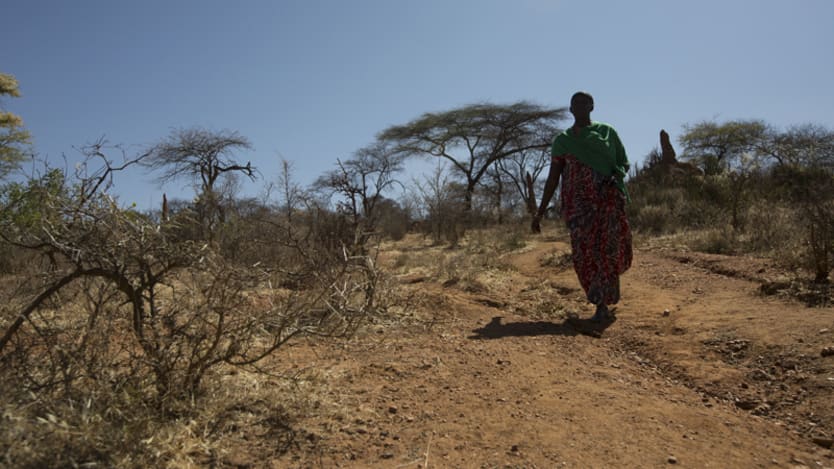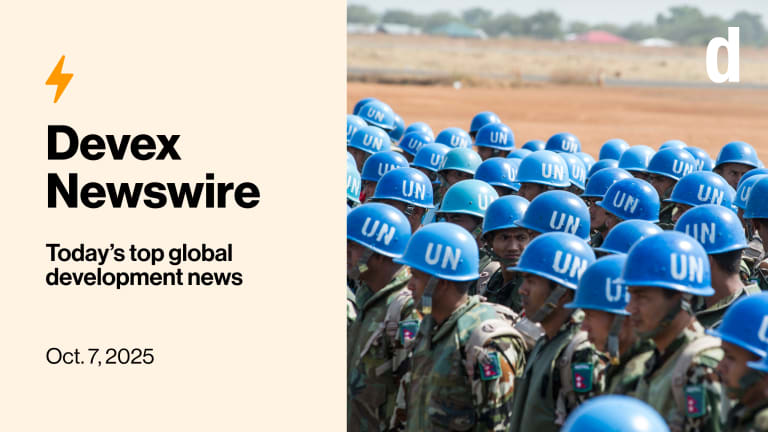
If ever there was a model of a relied upon, evidence-based early warning system, it would be the Famine Early Warning Systems Network.
Since 1985, the United States Agency for International Development’s FEWS NET has provided analysis on acute food insecurity by way of specialized reports on weather and climate, markets and trade, agricultural production, livelihoods, nutrition and food assistance. Humanitarian risk managers around the world pour over its analysis, combine it with their own ground reports and create dashboards based on its numbers. The system is regularly held up as the gold standard of early warning — a topic front and center in global humanitarian and development conversations for years as an area that deserves more attention and funding.
But one of the oldest early warning systems, “critical to raising the alarm for early planning,” according to World Vision Senior Director for Humanitarian Emergencies Mark Smith, found itself in an alarming position last week: On the list of programs the Trump administration aims to eliminate.
President Donald Trump’s 2018 fiscal year budget proposal — a leaked document that expanded on the already proposed 30.8 percent cut to overall foreign aid — proposed steep cuts to aid channeled through the USAID Bureau of Food Security on top of the elimination of FEWS NET.
The future of the network remains unclear, as USAID does not “have additional details on what programs will be reduced as part of the FY 2018 request,” according to a USAID spokesperson.
Neither USAID nor FEWS NET responded to Devex’s inquiries related to the network’s current budget, although the agency’s August 2016 procurement opportunities forecast included a five-year, $1.5 billion contract for a new phase of FEWS NET, a federal government contract that in the past has been awarded to Chemonics, where FEWS NET’s technical team is housed in Washington, D.C.
Sunday night’s fiscal year 2017 omnibus deal has largely quelled fears sparked by the leaked budget. The budget deal maintains spending for most foreign aid programs, including additional funding for international famine relief. The $57.5 billion in foreign affairs appropriations includes $3.8 billion for international disaster assistance, of which $990 million is set aside for famine response in Africa and the Middle East, although there is no mention of FEWS.
Still, humanitarian leaders are concerned that such a crucial, broad-reaching program would be put on the chopping block at all — and maintain that the future of evidence-based decision making to save lives in food insecure contexts hangs on FEWS NET operations.
The network’s gathered data come in a variety of forms — mainly in monthly reports and maps detailing current and projected country-specific food security, along with timely alerts on emerging crises. Is there an increased likelihood for below-average rainfall in El Salvador in 2017? Expect to hear it from FEWS. It’s also the place donors and humanitarian organizations alike currently look for information on escalating risk of famine in Nigeria, Somalia and Yemen as well as up to date information on South Sudan’s famine.
“It’s concerning, especially when we’re talking about … the importance of scientific data to undergird our development and humanitarian response.”
— Jessica Moses, policy advocate at CAREIt’s the objectivity of the reports that makes FEWS such a valuable touchstone, several humanitarian leaders told Devex, especially considering the network isn’t just automated algorithms and scraped data. Analysts and specialists in two dozen field offices work with U.S. government science agencies, national government ministries, international agencies and NGOs to produce reports on more than 36 of the world's most food-insecure countries.
For World Vision, the information they receive from the network over time dictates how much attention they give to a particular context: “A snapshot of a month isn’t necessarily going to be helpful, but seeing that one month snapshot four, five or six months in a row alerts you to significant problems looming on the horizon,” Smith said.
In October 2016, World Vision was already receiving early warnings for famine in two counties in South Sudan’s northern Bahr el Ghazal state, which “helped galvanize the humanitarian community to push for emergency response capacity to this location,” Smith said. When the famine was officially declared in 2017, preparation and action from the early warning “prevented the loss of life of tens of thousands of people, if not hundreds of thousands,” Smith added.
FEWS NET’s widespread use also makes it an important link for humanitarian actors, donors and local governments, Roger Yates, global director of disaster risk management for Plan International, told Devex.
“If we’re raising issues with donors, they’re working off the same page,” Yates said. “We don’t have to convince them of the problem. The fact that you’ve got one high quality source of analysis and information is really useful as an arbiter.”
FEWS partners with NASA, the National Oceanic and Atmospheric Administration, the U.S. Department of Agriculture and the U.S. Geological Survey, which makes it hard to imagine another donor picking it up, were it to be dropped from the U.S. budget, although it’s too soon to rule it out, humanitarian leaders told Devex.
“Whether the United Nations or another government, we’d have to replace it,” Smith said. “It’s not something that we can go without. You won’t have anyone walking away saying ‘that was nice, let’s move on.’ Talk about stepping away from a really important task and responsibility … and just not sure what the justification for it is.”
Why FEWS is on the chopping block is a mystery to the humanitarian sector, although its provision of climatic analysis and subsequent ties to climate change work is one good guess, according to Jessica Moses, a policy advocate focused on humanitarian issues at CARE.
“It’s in line with what we’re seeing with some of the trends related to global climate change because they go hand in hand, and if you’re taking down the climate change platform as well as FEWS … it’s troubling.”
Eliminating FEWS would create a massive gap of consistent reporting and consistent data, “which doesn’t sound as sexy as it should,” Moses commented, but is important nonetheless.
“It’s concerning, especially when we’re talking about, in a time of alternative facts, the importance of scientific data to undergird our development and humanitarian response so we can say ‘this is exactly what the need are, this is why, this is how we need to respond,’” Moses said.
The fate of FEWS will have to wait until debate on the 2018 budget picks up at the end of May or early June, when Trump’s full budget proposal is expected.
Stay tuned to Devex for more news and analysis of what the Trump administration means for global development. Read more coverage here and subscribe to The Development Newswire.
Read more coverage on foreign aid under the Trump administration:
▶ Budget bill puts Congress in US aid driver's seat
▶ Steep US foreign aid cuts outlined in leaked budget document
▶ As budget negotiations begin, here's where US Congress stands on foreign aid
▶ Digging deep: How Trump's budget affects everything from local jobs to foreign stability
Search for articles
Most Read
- 1
- 2
- 3
- 4
- 5








